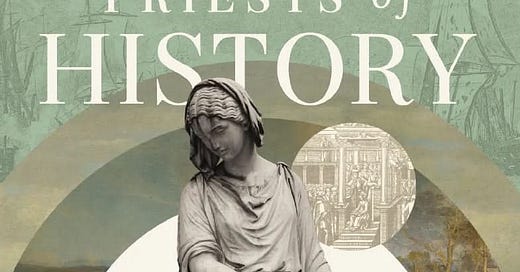Sarah Irving-Stonebraker
Priests of History: Stewarding the Past in an Ahistoric Age
Grand Rapids, MI: Zonderan Reflective, 2024.
How can Christians engage meaningfully with history?
In an age underpinned by the idea that life is about self-invention and fulfilment, contemporary Western culture holds that the past has little to teach us. We live in what this book terms the "Ahistoric Age," in which we are profoundly disconnected from history.
In the attempt to appear relevant, the church often embraces this ahistoric worldview by jettisoning the historic ideas and practices of Christian formation. But this has unintended consequences, leaving Christians unmoored from history and losing the ability to grapple with its ethical complexities.
In Priests of History, Sarah Irving-Stonebraker draws upon her expertise, and her experience as an atheist who has become a Christian, to examine what history is and why it matters. If Christians can learn how to be "priests of history," tending and keeping our past, history can help us strengthen and revive our spiritual and intellectual formation and equip us to communicate the gospel in a confused and rootless world.
If you like recent books by Carl Trueman, Andrew Wilson, and Chris Watkins, then you’ll also enjoy this new book by Dr. Sarah Irving-Stonebraker (SIS) about the importance of history for political discourse as well as for Christian discipleship.
People who rail against Christianity have no idea of how much they are influenced by Christianity at a subliminal level.
People raving and ranting about Israel and Gaza have no knowledge of the history of Palestine/Israel beyond memes and emotional outbursts from the last 24 hr social media cycle.
Instead, SIS argues: “The contemporary secular worldview in the West particularly strikes me as ahistorical at heart. The premise underpinning the idea that our lives are a matter of self-invention is that the are no enduring stories shaping our identities and providing normative direction from public life. There are no traditions, histories, or inheritances that provide a compelling or agreed-upon vision of the good life; there are not transcendent stories or larger narratives” (xxi).
However, this lack of rootedness and historical ignorance can plague Christians too who replace redemptive-history and church history with religious consumerism and reactionary responses to topics.
What characterizes an ahistorical age is several things:
We believe that the past is merely a source of shame and oppression from which we must free ourselves.
We no longer think of ourselves as part of historical communities.
We are increasingly ignorant of history.
We do not believe history has a narrative or a purpose.
We are unable to reason well and disagree peaceably about the ethical complexities of the past - that is, the coexistence of good and evil in the same historical figure or episode.
Those five points hit me like a tonne of bricks because I find this rings so true.
This rootless ignorance of history and disparagement of history is something SIS claims is created by social media and the digital world with its relentless self-creation. “Digital tribalism is profoundly ahistorical” she writes, because “Tribal identities emerge largely through the choice of otherwise unconnected individuals who are not part of any larger historical story” (30).
The gospel can be good news here because rather than live rootlessly, we can tell people that they can be part of a history and a historical people united by faith. Be that as it may, the ahistorical trend can negatively impact the church in a number of ways:
Doctrinal drift from orthodoxy.
Individualism and comfort.
Entertainment and celebrity culture.
A consumerist and marketing model.
Corporate and depersonalised ministry models.
The antidote to all that SIS argues is for Christians to be “priests of history” so that we engage in history in our daily lives and pass down our heritage, including intellectual content, spiritual formation, and discipleship.
A magnificent read and terrific book, thoroughly recommended!





Just about to pick it up and start reading on my balcony when I saw this post. One thing I love about using the St Bernard’s Breviary based on the BCP 2019 is that it includes ancient prayers each day written by saints now before the throne. That alone creates a daily rootedness in history.
I think I beat you to it Dr. Bird I finished it a month before you posted the review haha!!😆 It’s a great book because I love History and especially church history which is what mostly read. I appreciated hearing her conversion story from Atheism to Christianity by studying history. God works in providentially mysterious ways. Also I appreciated learning from a Aussie perspective on church history etc. I think every Christian needs to read it. Our faith is after all a historic faith of the redemption for all of mankind.